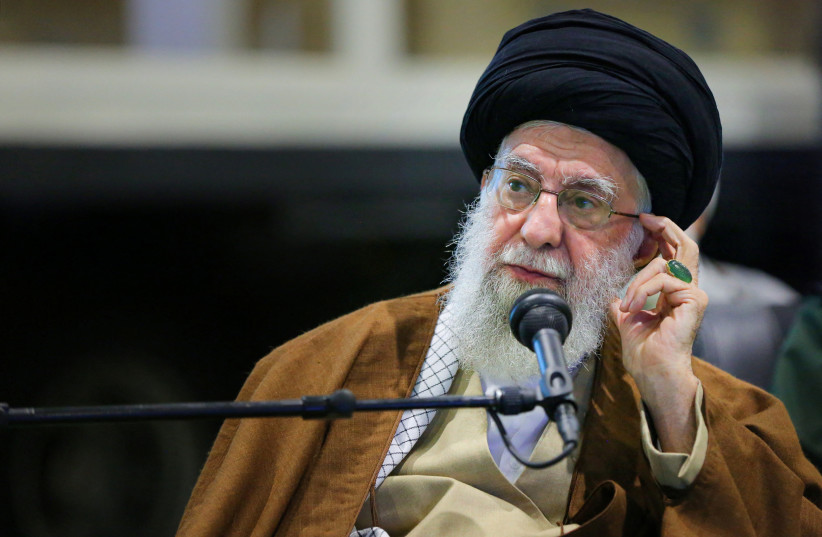Iran picks new supreme leader: The impact on Israel, nukes and all-out war
Iran’s Guardian Council’s decision this week to disqualify virtually all “pragmatists,” including former president Hassan Rouhani, from public office makes ongoing conflict between Israel and Iran’s proxies a virtual certainty, and war more likely than ever.
At stake on March 1 are both the parliamentary elections as well as elections for the 88-member, eight-year term Assembly of Experts.
This round of the Assembly of Experts is expected to select the next Supreme Leader, given that Iranian Supreme Leader Ayatollah Ali Khamenei is nearly 85 and has been sick repeatedly.
Who will be the next supreme leader?
From 1997-2005 and again from 2013-2021, Khamenei experimented with Iranian presidents who were reformists and pragmatists, Mohammad Khatami and Hassan Rouhani respectively.
Although Rouhani was still in power in 2020, by that time the US had pulled out of the Iran nuclear deal, which was a signature policy of Rouhani’s, and Khamenei had already decided to cut anyone other than hardliners out of future power.

For the 2020 Iranian parliamentary elections, Khamenei not only disqualified reformists, the closest Iran has to a group that believes in some Western values, who had been disqualified from running for years.
Rather, he started to also disqualify pragmatists, whose bedrock values were as anti-Western as Khamenei’s hardliners, but who believed that trying to reach deals with the West to improve relations was a tactical imperative.
This continued in the 2021 presidential election of hardliner and Khamenei favorite, Ebrahim Raisi, with the shocking disqualifications of top Iranian officials First Vice-President Eshaq Jahangiri and former parliamentary speaker Ali Larijani from running for office.
These moves and the banning of hundreds of other candidates, by Khamenei, or technically by his Guardian Council, which does his bidding in banning undesirable candidates from running, brought voter turnout down to record lows.
While some areas still reached 40% or more in voter turnout, some areas had single digit voter turnout, as compared to 70% voter turnout in 2017.
At a collective level, whereas Raisi lost the 2017 election to Rouhani (back when Khamenei was still allowing partially free elections) by around 23.6 million to around 15.8 million, Raisi’s “win” in 2021 saw him only rise to 18 million.
In other words, had all the voters who voted in 2017 voted again, Raisi still would probably have lost by a couple of million votes.
He only won because he had no real opposition and an artificial coerced drop in voter turnout.
Many reformists and pragmatists have been critical of Iran’s role in Syria’s civil war during the 2010s and other adventurous violent moves, such as the recent missile attacks on adversaries in Iraq, Syria, and Pakistan.
If the pragmatists had remained in power, there probably would have been a renewed nuclear deal JCPOA 2.0 in mid-2021, given that US and Iranian pragmatist negotiators had agreed on around 90% of the terms.
Israel would not have liked America relieving sanctions pressure from Tehran, but the fact is that once China and Russia made the strategic decision to ignore sanctions, mere sanctions from the US and the EU were going to be insufficient to force the Islamic Republic to change its terrorist proxies and nuclear behavior.
Under Raisi’s hardliners, this has meant a constant push for enriching record levels of uranium to get to the nuclear threshold for not only one nuclear weapon but potentially for an arsenal.
Further development of nuclear weaponry
Institute for Science and International Security President David Albright has said that Tehran, if it decides to, is so close to the threshold that in one month it could weaponize enough uranium for six potential nuclear weapons, and in five months, enough for 12.
This number will likely only grow under a continued hardliner leadership.
Pragmatists may not love Israel or the US any more than their hardline brethren, and there was plenty of terrorism and nuclear issue jousting when they were in power.
Yet they might have rolled back some of the terrorism in the region and a new JCPOA 2.0 could have led to the Islamic Republic giving away its current enormous stock of enriched uranium.
This would have only kicked the can down the road until expirations of the JCPOA’s nuclear limits in 2025 and 2030, but given that no one has slowed Iran’s nuclear progress very much since mid-2022 and the current Gaza War, that might have been valuable breathing room for Israel.
With Raisi and all of the branches of government controlled by hardliners, and Raisi possibly in place to succeed Khamenei himself, Jerusalem and Washington can expect only continued hostility and violence from Iran for the foreseeable future.





Comments are closed.